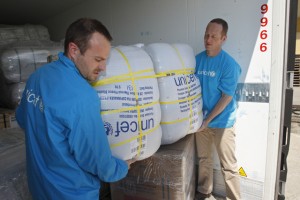UNICEF deploys its largest emergency supply operation ever in a single month Record amount of emergency aid delivered to children caught in record number of crise
2014-08-26
COPENHAGEN/ GENEVA/ NEW YORK/ HONG KONG, 26 August 2014 – This August UNICEF shipped 1,000 metric tonnes of life-saving supplies for children caught in the world’s most urgent crises -- the largest emergency supply operation in the organization’s history in a single month. The amount delivered would fill 19 cargo jumbo jets.
 |
| © UNICEF/NYHQ2014-0745/Mendes |
“UNICEF’s massive deployment responds to a massive need in many different countries at the same time,” said Shanelle Hall, UNICEF’s Director of supply and logistics operations. “Now it is vital to keep humanitarian corridors open so these supplies continue to reach the children who desperately need them.”
Foreseeing the need to ramp up the response to conflict in Iraq and the Ebola outeak in West Africa, UNICEF secured as many chartered flights as possible.
In 27 days, the organization’s Copenhagen supply hub has dispatched 33 emergency cargo loads to the world’s most troubled regions:
• Central African Republic received 26 MT in medical equipment, vaccines, emergency food rations and hardware to dig water wells. Among essential medicines, anti-malarial supplies have been critical in protecting children from the country’s leading cause of death.
• Iraq’s displaced families and children in the northwest received 500 MT that included emergency food rations, water, medical supplies, tents, and ready-to-use therapeutic food. UNICEF’s dispatch of 4 million doses of polio vaccine will protect children’s health in the wake of the re-emergence of the disease due to the eakdown of health systems in neighbouring Syria.
• Liberia’s effort to contain the Ebola outeak has been strengthened by 248 MT of supplies from UNICEF such as latex gloves, safety goggles, and overalls to protect health workers, concentrated chlorine disinfectant and a range of essential medicines. UNICEF is also helping the government assess the country’s supply chain capacity, which is strained by the crisis.
• State of Palestine has received 3.5 MT in supplies, mostly in the form of essential medicines for Gaza to restock hospitals and health facilities that have been damaged in the conflict. UNICEF has also supplied vaccines which are essential to protect children who become especially vulnerable during massive population displacements.
 |
| © UNICEF/NYHQ2014-0849/Vas |
• South Sudan has received 34 MT of life-saving nutritional support and supplies, including ready-to-use therapeutic foods for vulnerable children, 50,000 of whom are at risk of dying from malnutrition. Nearly one million children under five years old in South Sudan will require treatment for acute malnutrition this year.
• In Syria, UNICEF’s supply response, which began as cargo airlifts four years ago, has evolved into a steady pipeline of supplies that in August included 89 MT of water purification tablets and education kits. UNICEF is also inging in over 156 MT of health, education, and water supplies for displaced Syrian families in Lebanon and Jordan. Preparation for winter is underway as UNICEF stockpiles children’s winter clothing sourced from local suppliers in the region.
“During multiple crises of this magnitude children must come first. UNICEF is committed to staying the course. As long as children are in need we will continue to undertake these urgent, complex and vast supply operations,” said Hall.









